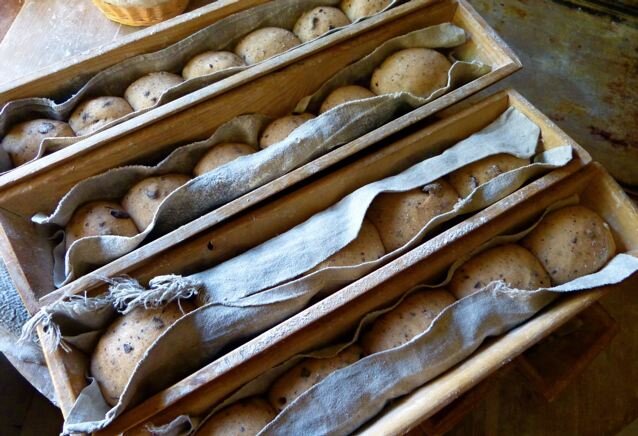Sourdough bread has a history that reaches back nearly as far as our own. In fact, until the late 1800s, a culture of naturally occurring yeasts and bacteria was the only method we had for leavening bread.
There is discussion about how sourdough leavening first came into being. Sourdough historian and scientist, Ed Wood, conjectures that its origin may be found in flat cakes of cereal grains like wheat or rye that were left unbaked and forgotten in the warmth of summer, making them the ideal home for a community of wild yeast. Some thrifty cook must have noticed the forgotten cake and baked it, thereby observing its rise, and over time an imaginative baker may have capitalized on this accident, creating our first intentional loaves of leavened bread.
Today, we have physical evidence that traces sourdough loaves to Ancient Egypt, where a bakery turned out bread for those who built the Great Pyramids. Likewise, on the cavernous walls of the tomb of Ramesses III we can see engravings of bakers making bread loaves in various shapes and sizes. And among the Roman ruins of Pompeii, there remain charred loaves of bread that survived the eruption of Mt. Vesuvius; they were found inside an oven, preserved in charcoal, covered in ash, each one marked with a baker’s stamp.
We have sourdough recipes from 1600s France that call for feeding the starter three times before making dough, just as many of us do today. When Americans settled the Western Frontier and moved north to chase gold, they took their sourdough starter with them, ultimately earning them the moniker “sourdoughs.” We have long called bread the “staff of life” for the way it has kept us nourished through our daily toil, as well as through the wind and dust of war and upheaval.
The late 1800s brought the development of commercial baker’s yeast, which has among its virtues speed, predictability, and the easy means to standardize a machine-baked loaf across time and season. But subtlety, serendipity, the lovely means to tingle your senses and facilitate warm communion with both starter and loaf — these are not among them.
In our modern times, sourdough has moved in and out of fashion, from near non-existence in the 1900s to its recent pandemic upsurge. I wonder if we can attribute the new embrace of sourdough bread baking to the grounding comfort of ritual, the way it instills in us the pride and security of self reliance, and how it graces our homes with an aroma that wends beyond the kitchen to synchronize the music of the household. Or it could simply be that when we take a loaf out of the oven and gaze upon it in wonder, grateful and admiring, we are changed.
In recent years, sourdough attracted the label “artisanal,” connoting ambitious and complicated. But if it was all that difficult and delicate a process, it would never have occurred naturally in the warm summer months of our ancestors or found its way across millennia from then to now.
After years of baking with sourdough and teaching the process to countless others, I can offer you this: As long as you have flour and water, you will always have bread. It is that sure and holy and empowering an alliance.
Copyright, Ellen Arian, Ellen’s Food & Soul




